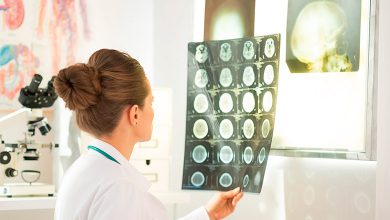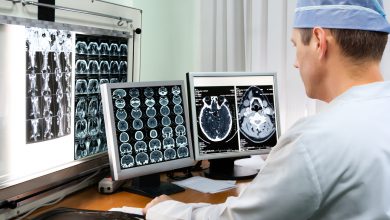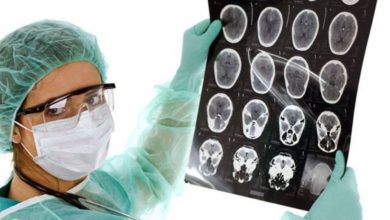Pituitary cyst - causes, symptoms, diagnosis and treatment
The content of the article
- Putuitary gland cyst - definition
- Causes of cysts in the pituitary gland of the brain
- Symptoms of adnexal cyst
- What effect does a cyst have?
- Danger of disease
- Pituitary cyst during pregnancy
- Treatment methods for pituitary cyst formations
- Principles of disease treatment: drugs and surgery
- Treatment of pituitary cysts “the old fashioned way”
- Other methods
In most cases, a pituitary cyst of the brain does not manifest itself clinically, but is detected only when certain tests are performed. It is characterized by the presence of a hard shell filled with liquid.
Putuitary gland cyst - definition
The pituitary gland of the brain is the place that produces all active hormones, and they already affect the functioning of the entire endocrine system. Lack or oversupply of hormones has a catastrophic effect on vital functions such as growth, fertility and metabolism.
The tumor itself is capable of affecting the body only when its size exceeds critical sizes. In cases where a cystic formation grows and has an adverse effect on a person’s neurological functions, complex treatment is required. Young people, mostly males, are at risk.
Causes of cysts in the pituitary gland of the brain
The etymology of this disease is constantly being studied. But there are main reasons that provoke the development of cystic formations in the pituitary gland area:
- Predisposition at the gene level;
- Various infections that can affect parts of the cerebrospinal fluid;
- Consequences of injuries;
- Neurosurgical operations, including craniotomy.
Despite the fact that people with such data are at possible risk, this is not a prerequisite for the development of the disease. A cyst in the pituitary gland can appear quite suddenly, even in those whose relatives have not been exposed to the disease.
Symptoms of adnexal cyst
In 80% of cases, a cystic formation in the pituitary gland does not make itself felt. If there is a suspicion that the patient has this disease, symptoms begin to appear only in cases where the formation reaches a critical size (10 mm) or is located too close to the center of hormone production.
The primary signs of the disease include:
- Constant, nagging headache;
- Deterioration, and in some cases complete loss of vision.
The manifestation of signs of the development of this disease does not end there. As the size of the cyst increases, more and more new symptoms appear:
- Diabetes;
- Disturbance in the functioning of the genital organs;
- Rare or frequent urination;
- Sudden changes in mood;
- Rare heartbeat and drop in blood pressure;
- Irregularities in the menstrual cycle in women;
- Mental disorders;
- Fatigue and a feeling of constant desire to sleep.
What effect does a cyst have?
The pituitary gland is a part of the brain responsible for the production of vital hormones:
- Thyroid-stimulating;
- Luteinizing;
- Somatropic;
- Adrenocorticotropic;
- Prolactin;
- Follicle stimulating.
The hormones described above take an active part in the development of the immune and endocrine systems, and are also responsible for metabolic processes in the body.
The cyst has a detrimental effect on the production of hormones, which leads to disruptions in the overall functioning of the body.
Danger of disease
The danger is that under the pressure of education, the natural course of hormone production is disrupted. After which all systems of the internal functioning of the body fail, because one way or another, all organs depend on the supply and production of hormones.
In cases where the growth of a cystic formation accelerates, disability . And the worst thing is that this tumor, under certain influences and in the absence of treatment, can develop from benign to malignant.
At the initial stage, blindness is temporary, usually affecting only peripheral areas.
But with increasing pressure on the optic nerve, the patient experiences complete loss of vision. Not only the outer shell grows, but also the liquid inside it. This is what has a magnifying effect on the internal cavity of the cyst. In rare cases, the membrane ruptures, leading to sepsis and death.
Pituitary cyst during pregnancy
The phenomenon in itself is impossible, since pregnancy usually does not occur with this disease. This is why the pituitary gland area is usually checked for tumors before fertilization. Elevated levels of prolactin make fertilization impossible.
The woman undergoes phases of drug treatment, the purpose of which is to reduce the hormone prolactin and normalize the functioning of the gland. If the body responds positively to treatment, the woman’s reproductive ability is restored.
In those women who, despite everything, were able to get pregnant, having a cystic formation in the pituitary gland, the cyst will not grow throughout the perinatal period. But immediately before labor begins, doctors prescribe an operation to surgically remove the infected cells.
Treatment methods for pituitary cyst formations
The purpose of treatment directly depends on the causes that caused the disease, the nature of the disease and the size of the tumor cavity. Medicine resorts to drug therapy and surgery, because treatment of a pituitary cyst in the brain requires drastic intervention.
As a rule, patients come with complaints of headaches, decreased vision, and even general fatigue of the body. After conducting an initial examination and taking basic tests, doctors prescribe diagnostic studies that can confirm or refute the diagnosis:
- Tomography. An MRI is performed and in cases of a pituitary cyst, it will be visible as a rounded formation in the sella turcica. Next, in order to establish the nature of the origin, contrast computed tomography . A benign tumor, unlike a malignant one, does not accumulate the marker in the tissues;
- Tests to determine hormone levels. The purpose of this study is to determine the affected area. And also to understand which direction of drug therapy to choose. When a certain type of cyst, its size and exact location were detected, cases of complications and dysfunction arose. Acute diagnosis is subject to the following studies:
- Doppler studies - determining the state of the vascular system and the quality of blood supply to the brain;
- Cardiac examination - ECG and other methods for detecting heart failure;
- Blood test - cholesterol determination and blood clotting assessment;
- Measuring blood pressure and determining the presence of hypertension;
- Carrying out a biochemical blood test to identify infections and the autoimmune nature of the disease.
Principles of disease treatment: drugs and surgery
Treatment of pituitary cysts is carried out either with medication or through surgery. Emergency surgery is performed under the following circumstances: frequent seizures, hydrocephalus, rapid growth, internal bleeding, ruptures, loss of brain tissue surrounding the mass.
Cyst removal proceeds as follows:
- Shunting is the introduction of a special tube through which the cavity is drained;
- Endoscopic surgery. The process is carried out using punctures with endoscopes;
- Craniotomy. Radical surgery to remove the formation and open the skull.
When choosing a treatment method, a council of doctors gathers, who, after studying all the tests received, taking into account all the characteristics of the disease and the patient’s personality, make a decision regarding the treatment to be performed.
To maintain the health of brain cells necessary to provide the required level of oxygen and glucose, nootropics are prescribed - Picamilon, Pantogam, Instenon. Antioxidants increase the resistance of brain tissue to changes in intracranial pressure. Important therapeutic functions are prescribed by immunomodulatory, antibacterial and anti-inflammatory drugs.
In general, drug therapy is a complex method in the form of courses lasting 10-12 weeks. In addition, these courses are repeated every 6-7 months. A pituitary cyst is an extremely dangerous pathology. Treatment of the disease should be carried out in a timely manner after the necessary examinations.
Pituitary cyst of the brain, consequences after removal:
- Restoration of reproductive and genitourinary structures of the human body;
- Complete disappearance of headaches and loss of vision;
- Metabolism returns to normal;
- The human immune system begins to work as before (as before the disease)
Treatment of pituitary cysts “the old fashioned way”
In order to improve the general well-being of the patient in the absence of exacerbation of the disease, they resort to treatment with folk remedies . Treatment methods using herbal decoctions and tinctures have found very widespread use among people.
Bedbug has established itself as an ideal assistant in the fight against cystic formations, in particular in the brain. It is enough to add 10 drops to a glass of water and a 10% alcohol solution of bedbugs will gradually reduce the cyst, and the disease will recede.
Hemlock. Traditional medicine advises using this remedy with extreme caution. Oil solutions of this product are very toxic and are instilled into the nose, which has an additional effect on the entire body.
In order to improve metabolism, traditional medicine recommends taking decoctions of string and oregano. Additionally, pharmacies sell herbal teas that have antitumor effects. But in order to avoid complications, it should be remembered that any treatment has its contraindications.
Even before starting herbal therapy, you should get qualified advice from your doctor. Treatment of a pituitary cyst involves a long course of the disease, most often hidden, and an equally long recovery period after the operation. But before you go to see an endocrinologist, you should know that if the diagnosis is confirmed, then the patient’s card will record it as “adenoma” - the scientific name of the cyst.
Other methods
In addition to all the cases described above, there is also radiation therapy to combat the disease. However, it is resorted to only in extreme cases - the patient refused to undergo surgery or there are contraindications for prescribing surgery.
But radiation therapy will only help if hormonal imbalance has not yet begun. In any case, none of the treatment methods can guarantee that the treatment will be successful. After all, there are often cases when the pituitary gland cyst of the brain returns, despite the fact that the initial treatment gave positive results.
Finally, it is worth noting that in case of any illness, doctors advise to tune in to the positive and maintain good spirits. After all, there have been cases where placebo effects gave amazing results in treatment, proving to official science that faith works miracles.
Please rate the article:

 (5 ratings, average: 4,20 out of 5)
(5 ratings, average: 4,20 out of 5)



